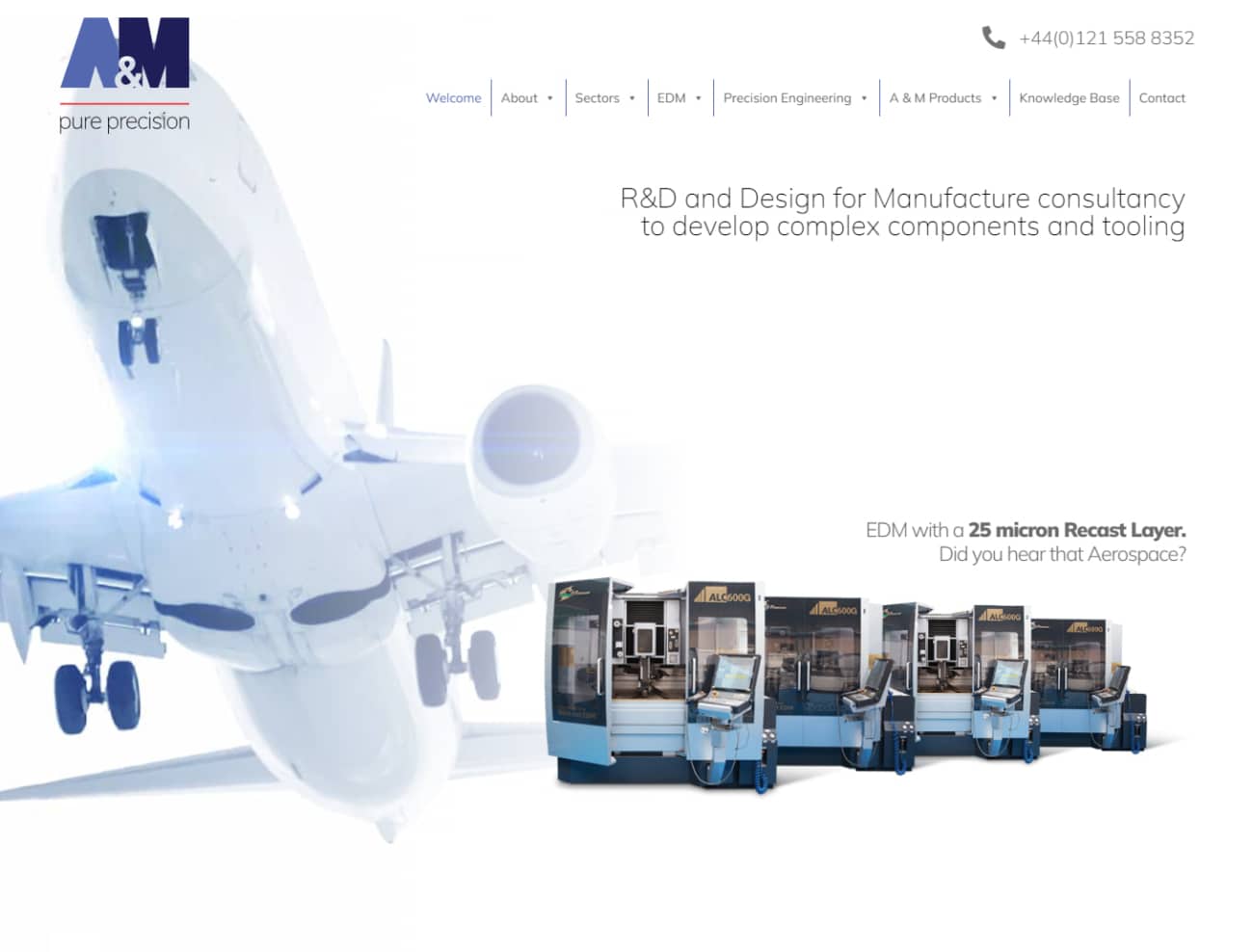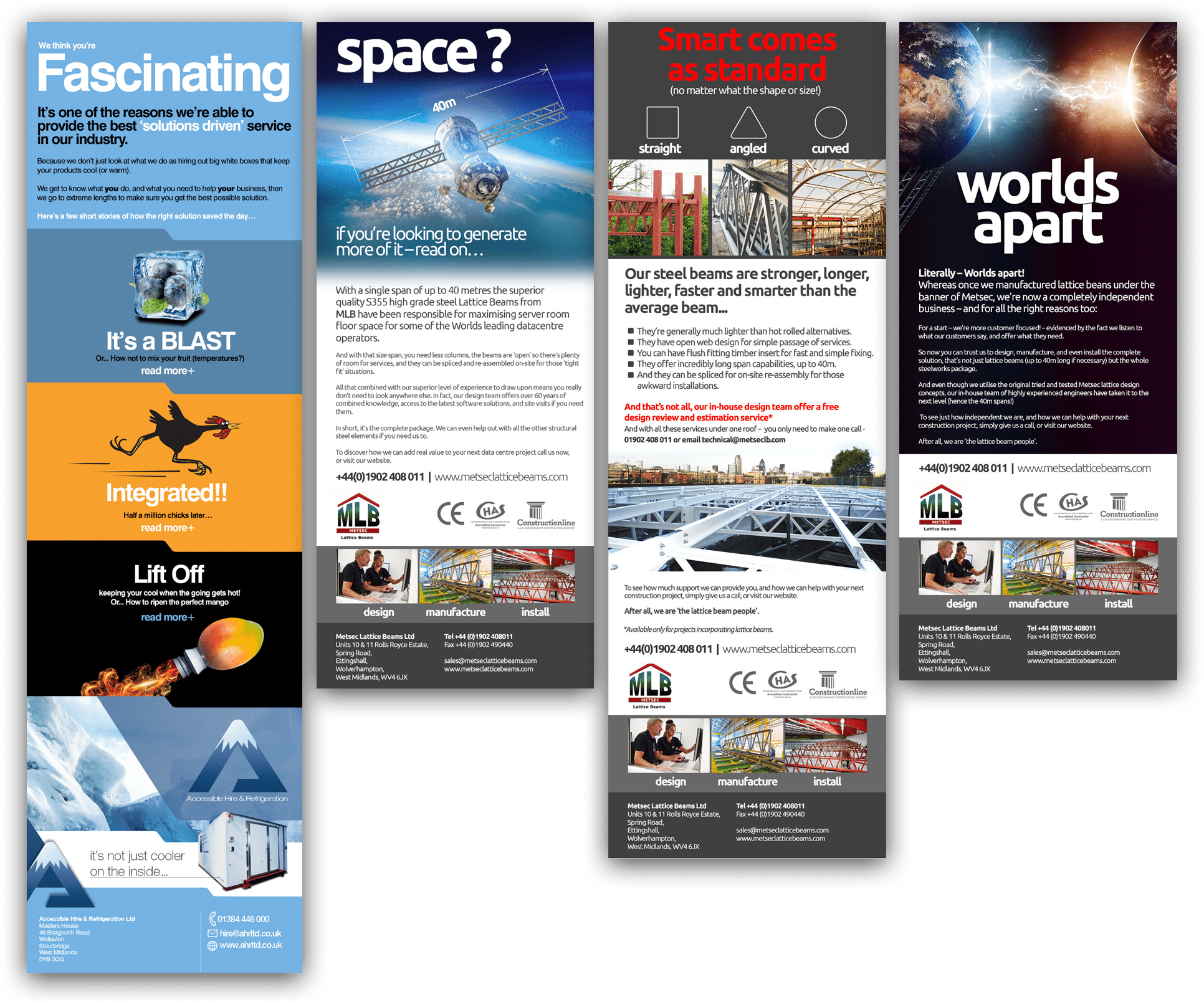Digital Marketing for Manufacturers: A Guide
But digital marketing is crucial for capitalising on the vast range of new opportunities available to you; connecting you with new customers and helping you to nurture your relationship with your pre-existing ones.
It’s about more than just a flashy website and a social media presence. Your approach will impact how you interact with your customers, helping you to streamline your sales funnel, and stand out in a saturated market. In an ever-changing online world, it can be difficult to know where to start. In this guide, we keep things simple and provide you with the tools you will need to do so.
Key Talking Points:
Before getting started, it’s worth discussing the different types of marketing to help you better understand how these methods work.
There are a variety of different types of marketing, most of which fall into one of four broad categories:
- Traditional Marketing: Covers all those types of marketing which existed before the internet, some of which still exist today, like print and billboard adverts.
- Digital Marketing: This focuses your promotion on methods which have become prevalent since the rise of the internet and the boom in technology. Examples of this include SEO, Social Media Marketing, and content marketing. We explore the various types of digital marketing in greater detail below.
- Outbound Marketing: This covers marketing which travels in one direction, from your business to potential customers, interrupting their daily routine with information about your business.
- Inbound Marketing: A much more subtle tactic, this entails providing content or services which your audience will find useful, in the hopes of attracting paying customers. Examples of this include blogs, e-books, or webinars.
One strategy can fall under several of these categories. Thus, while we will focus on Digital Marketing here, we will be discussing various outbound and inbound forms.
When considering which type of marketing to choose, you must understand the distinction between these different strategies. The methods you choose should be influenced by the needs of your audience, your competitors, and your business goals.
Many manufacturing companies we deal with rely on existing customers and word of mouth. Their decision-makers are great at what they do, but they struggle to devote enough time to marketing their manufacturing business.
In those scenarios, we might wonder what is driving their long-term business growth and, more importantly, what would happen if they saw a sudden drop in sales.
Digital marketing is an effective way of combating this issue. As a manufacturer, choosing the right strategy could offer you a powerful platform to increase your visibility, target specific audiences, and cultivate stronger relationships with your customers. This means getting your brand seen by potential customers across the country, or world.
But why digital marketing over traditional methods? Granted, traditional sales tactics are still a piece of the pie. But you’re going to be seen by more people online (for cheaper in the long run). By carefully implementing targeted strategies, you can reach your audience at the right moment in their buying journey - when they’re ready to buy!
We have found that digital marketing allows for improved customer engagement and trust. Beyond building brand awareness, digital marketing can provide insights into customer behaviour, allowing you to adapt and refine your manufacturing approaches to meet evolving demands.
If you’re sold on the idea of digital marketing for your manufacturing business, the next step is to ask: ‘Which method is best suited to my business?’ Here at Omnisity, we have a range of strategies in our toolkit to choose from, but the right method will depend on your specific needs and long-term goals.
Search Engine Optimisation (SEO)
Put simply, SEO involves implementing various strategies to organically increase your online visibility in Search Engines (like Google) to reach new and potential customers who may be interested in your services.
SEO is complex and multi-faceted, but at its core, it involves incorporating relevant keywords into your website and creating valuable content which fulfils what your audience is looking for. This can be tailored to the specific needs of your manufacturing business. For example, many clients we work with often have specific niche markets. In these scenarios, your SEO should be tailored to these markets to ensure your website is being seen by the right eyes.
It's a form of inbound marketing, as it involves creating the specific content which your audience is looking for, in the hopes of drawing people towards your brand who will convert into paying customers.
Here at Omnisity, we’re experienced in providing SEO for manufacturers. If you’re hoping to implement this strategy, we recommend getting in touch so that we can advise you of the next steps.
Want to learn about the power of SEO for Manufacturers? Learn how we increased A&M EDM’s search visibility by 46.54% in 3 months.

Crafting a clinically clean aesthetic, infused with advanced SEO marketing strategies to amplify visibility...
Pay-Per-Click Advertising (PPC)
SEO is a good long-term strategy, but it can take time before you start seeing your desired results.
That’s why Pay-Per-Click (PPC) is another popular strategy for manufacturing businesses. This involves displaying your website at the top of search engines through paid advertisements - the success of which will be heavily influenced by the quality of your content, the specific keywords you are targeting, and how well your campaign is managed over time.
This strategy does provide a host of benefits; it is quicker, gives you greater influence over who arrives at your site, and offers greater financial control. If you’re unsure whether SEO or PPC is right for your manufacturing business, we recommend exploring our recent article on their core differences.
Want to hear about our PPC work for manufacturers? Check out our work for Arc Metal Design.
Content Marketing
Content marketing is often utilised to supplement various marketing strategies, like SEO, PPC, or Social Media Marketing.
It involves creating and sharing content in various formats like blogs, videos and infographics. The format will depend on the buying stage that its reader is at:
- For those at the awareness stage, they are slowly becoming aware of a problem and are looking for a solution. You may want to create blogs to help the reader understand their issues better and identify some potential fixes. You’re not explicitly selling at this stage, but readers will start to learn about your brand through association.
- For those at the consideration stage, they are trying to decide on the right solution to their problem. Here, you should highlight the benefits of your offering over competitors. This could be in the form of a blog, a case study, or a video which helps your audience understand you better.
- Finally, at the conversion stage, your audience is ready to buy and it's up to you to help them do so. Here, key information about your products and services, like price, should be clear. This customer should have a clear understanding of how to buy from you and what happens after they do so.
Ultimately, content marketing can be used for various reasons. For our manufacturing clients, we use it as an opportunity to establish them as industry experts and build trust with their potential customers.
Email Marketing for Manufacturers
Email Marketing is a common form of outbound marketing, as it involves directly reaching out and engaging with your audience regularly.
This is a useful tool for building a relationship and maintaining a memorable brand. This method allows you to create targeted campaigns through the segmentation of your subscriber list; allowing you to create personal messages which will resonate with your subscribers.
Granted, this method won’t be suitable for every manufacturing business, but if it is, it could prove invaluable.

Social Media Marketing
Manufacturers often use Social Media Marketing to showcase their work, communicate brand values, and engage with potential clients. By responding and interacting with members of your online community, it’s a great way of establishing trust and strengthening your relationship.
Of course, Social Media Marketing strategies could be organic or involve Paid Social Ads. Both tactics have their advantages and will depend on the needs of your business.
To see the power of Social Media, learn how we gained 2,650+ paid advert visits for Lonestar Fasteners Europe.
Before you commit to a strategy, you must establish which is best suited to your needs. Choosing the wrong strategy from the outset could do more damage than good (in the worst cases, this could result in high costs with little to no returns).
To avoid this, thoroughly analyse your target audience and your competitor’s behaviour to determine how you can differentiate your brand in ways that will make an impact. It’s also important that you get clear on your goals and objectives, as this could impact the correct route. For example, PPC may be the right approach for a business that requires fast conversions, while SEO is a better solution for those who are hoping for long-term results at a lower upfront cost.
We appreciate that the needs of the business will depend on who is driving the marketing campaign. Here at Omnisity, we have experience supporting:
- Manufacturing Business Owners and Managing Directors
- Marketing Directors
- Sales Directors and Managers
Your position may influence your goals and the time you have available to dedicate to the marketing efforts. This, along with your budget, should help to shape your campaign.
Determining your required budget isn’t one-size-fits-all and will depend on a variety of factors. Here at Omnisity, we are always on hand to help you choose a budget which will effectively deliver a return on your investments.
Factors to Consider
In deciding on a budget, you should bear in mind:
- Your goals: What you hope to achieve and, just as importantly, how quickly you hope to get there. Be realistic here, as some methods can take a while before you start seeing results.
- Your customers: Depending on whether you operate B2B or B2C could impact how long results take and how much it costs to achieve them.
- Your resources: We would never advise you to spend over your means. In situations where resources are limited, we recommend a smaller budget, increasing it as you start to see returns.
- Your chosen strategies: Some strategies, like PPC, may require more upfront costs (when paying for the ads, compared to organic strategies). Others, like SEO, require less upfront but may require continued investment with minimal return for longer to get your desired results.
These are just a few factors worth considering. We’re always available to help and chat through this, should you need it.
The Impact of Competition
It’s also worth doing a competitor analysis before you commit to a budget or campaign. Ultimately, the level of competition in your industry will influence the amount you need to invest to stay relevant and visible.
In evaluating what your competitors are not doing, try to establish new gaps and opportunities to reach your audience.
Allocating Budget Across Different Marketing Channels
It may be beneficial to spread your marketing efforts across multiple channels, to which you may need to determine how to allocate your budget between them.
To do so, you must understand the methods of each strategy and how they align with your business goals. Marketing should be a work in progress, so you must track the impact of your efforts and adjust your spending accordingly - investing more in channels that yield the best ROI.
Many manufacturing companies we deal with rely on their customer base and word of mouth. But, as we have shown in this article, digital marketing is a powerful way to increase your visibility, target specific audiences, and generate more leads - ultimately leading to more sales for you in the long run.
Whilst we have given you the tools to decide which campaign is right for you, we appreciate that digital marketing can challenging. We have over 25 years of experience delivering impactful marketing for manufacturers, so we’re here to help where we can. Just drop us a line and we can sort the rest.




